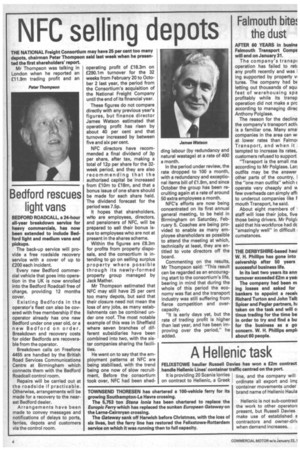NFC selling depots
Page 6

If you've noticed an error in this article please click here to report it so we can fix it.
THE NATIONAL Freight Consortium may have 25 per cent too many depots, chairman Peter Thompson said last week when he presented the first shareholders' report.
Mr Thompson was talking in London when he reported an £11.9m trading profit and an operating profit of £18.3m on £290.1m turnover for the 32 weeks from February 20 to October 2 last year, the period from the Consortium's acquisition of the National Freight Company until the end of its financial year.
These figures do not compare directly with any previous year's figures, but finance director James Watson estimated that operating profit has risen by about 40 per cent and that turnover increased by between five and six per cent.
NFC directors have recommended a final dividend of 3p per share, after tax, making a total of 12p per share for the 32week period, and they are also recommending that the authorised capital be increased from £10m to £18m, and that a bonus issue of one share should be made for each share held. The dividend forecast for the period was 7.5p.
It hopes that shareholders, whto are employees, directors, and pensioners of NFC, will be prepared to sell their bonus issue to employees who are not at present in the shares scheme.
Within the figures are £8.3m for profits from property disposals, and the consortium is intending to go on selling surplus property where possible through its newly-formed property group managed by Jack Mather.
Mr Thompson estimated that NFC may still have 25 per cent too many depots, but said that their closure need not mean the loss of any jobs, as many establishments can be combined under one roof. The most notable example of this was in Sheffield where seven branches of different subsidiaries have been combined into two, with the sister companies sharing the facilities.
He went on to say that the employment patterns at NFC are being stabilised, with the trend being one now of slow recruitment, Before the consortium took over, NFC had been shed ding labour (by redundancy and natural wastage) at a rate of 400 a month.
In the period under review, the rate dropped to MO a month, with a redundancy and exceptional items bill of £1.9m, and since October the group has been recruiting again at a rate of around 50 extra employees a month.
NFC's efforts are now being concentrated on its first annual general meeting, to be held in Birmingham on Saturday, February 5. Coaches are being provided to enable as many employee shareholders as possible to attend the meeting at which, technically at least, they are entitled to vote directors off the board.
Commenting on the results, Mr Thompson said: "This result can be regarded as an encouraging start to the consortium's life, bearing in mind that during the whole of this period the economy was flat and the transport industry was still suffering from fierce competition and overcapacity.
"It is early days yet, but the rate of trading profit is higher than last year, and has been improving over the period," he added.




















































































